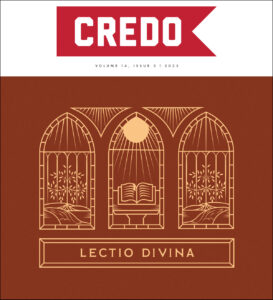
Lectio Divina in a Distracted Age
I did not need Samuel James’ excellent book Digital Liturgies: Rediscovering Christian Wisdom in an Online Age to convince me I’m distracted. Like many of you, I feel the palpable pull toward consumption and triviality when waiting in line or stuck at a stoplight. What I did need, however, was James’ reminder that the distraction of the human heart is not new to our digital world.
did not need Samuel James’ excellent book Digital Liturgies: Rediscovering Christian Wisdom in an Online Age to convince me I’m distracted. Like many of you, I feel the palpable pull toward consumption and triviality when waiting in line or stuck at a stoplight. What I did need, however, was James’ reminder that the distraction of the human heart is not new to our digital world.
In On the Incarnation, Athanasius summarizes the condition of fallen humanity. He writes,
For God had made man thus (that is, as an embodied spirit), and had willed that he should remain in incorruption. But men, having turned from the contemplation of God to evil of their own devising, had come inevitably under the law of death.
If the contemplation of God is what we were created for, then distraction is anything that takes our limited energy and resources and turns them away from God. This does not mean every Christian must become a monk or move to the desert to be lost in contemplation, free from worldly cares. But it does mean that as followers of Jesus, we should desire to be where he is. Listen to Paul as he encourages us in Colossians 3:1–2:
If then you have been raised with Christ, seek the things that are above, where Christ is, seated at the right hand of God. Set your minds on things that are above, not on things that are on earth.
In a world where distractions abound, Lectio Divina invites us to slow down and savor the words of the Bible, allowing them to penetrate the depths of our being. In doing so, we can seek “the things that are above, where Christ is.”
The practice of Lectio Divina may seem counterintuitive to our modern, fast-paced lives. Most of us are already stretched to the max for time. The contemplative life is ultimate, and it saturates our active lives with spiritual meaning. Click To TweetYet, in the intentional slowing down, in the prayerful silence between the words, we discover the transformative power of God’s living Word. As the Puritans remind us, it’s not about the quantity of verses we consume but the quality of our engagement with them. Seeking the things that are above requires depth and contemplative focus.
Finding focus in the hustle of life can feel like chasing a mirage. The concept of sitting still with the Word of God, especially in the practice of Lectio Divina, seems elusive, almost impractical, given the constant demands of our days. We are torn between the active and contemplative.
Aquinas recognized that our call to seek the things that are above does not demand a complete withdrawal from the world but rather a sanctification of our daily activities. The contemplative life is ultimate, and it saturates our active lives with spiritual meaning. Boersma concurs when he writes,
Our active life is worthy of celebration only because it aims at the contemplative life. Without a contemplative horizon, our human activities turn into distractions. If the active life is all there is, it remains without telos to give it meaning. Contemplation fills action with truth, goodness, and beauty. It is contemplation that gives action a share in its luster.
Spiritual reading, then, is an antidote to distraction. With its intentional stages of reading, meditation, prayer, and contemplation, Lectio Divina becomes a bridge between the active and contemplative life. It invites us to engage with the Word of God in a way that transcends mere consumption, fostering a contemplative focus amidst life’s demands.In the balance between the active and contemplative, Lectio Divina becomes a spiritual rhythm. Click To Tweet
In the balance between the active and contemplative, Lectio Divina becomes a spiritual rhythm. It doesn’t ask us to abandon the world but challenges us to sanctify our daily activities by permeating them with the transformative power of God’s Word. In the intentional slowing down, we discover that the contemplative moments with God become a wellspring for the Holy Spirit to work in our active engagements with the world.
Embrace Lectio Divina not as a retreat from the world but as a transformative bridge that connects our active lives with our contemplative telos. In seeking “the things that are above, where Christ is,” may we find, in the intentional engagement with God’s Word, the grace to navigate the distractions of our time and the strength to live a life sanctified in both action and contemplation.

